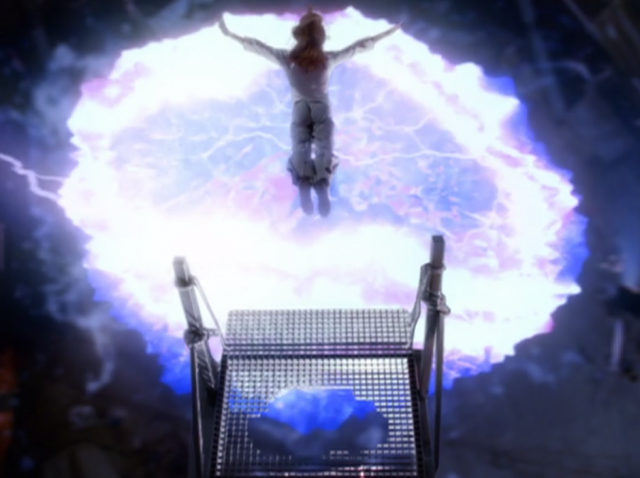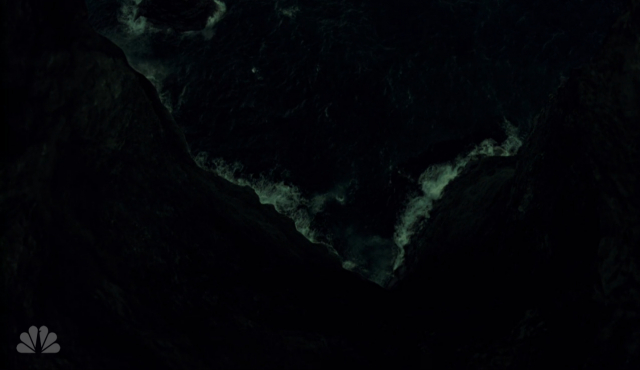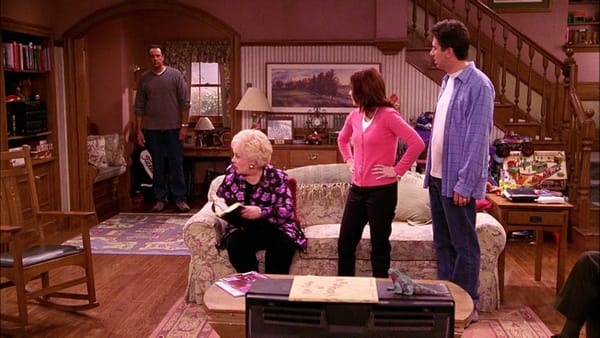The Fall (spoilers for Buffy the Vampire Slayer and Hannibal)

At first blush, "The Gift," the fifth season finale of Buffy the Vampire Slayer, and "The Wrath of the Lamb," the series finale (for now) of Hannibal would seem to have little to do with each other, beyond the obvious — both conclude with the protagonist plunging from a very great height to their presumed death. Because this is television, we know they will be back someday. Because this is genre fiction, we know that, in some ways, what they have done is a triumph. Buffy saves the world. Will Graham stops a deadly serial killer in his tracks. The music rises — an orchestral swell for Buffy, an ersatz Bond theme for Will — and they accept the gravity of their task.
Both of these stories are about giving into depression and committing suicide.
Every time I advance this argument to Buffy fans, they look at me like I've suffocated a kitten. It's easy to understand why. The ending of "The Gift" is perhaps Buffy's most heroic moment. The world will end if she doesn't sacrifice herself or her sister. It's too late for anything but the biggest and boldest of gestures — the final leap into the abyss. In some ways, reconfiguring this story as a depression narrative robs Buffy of some of what makes her most potent.
The same goes for Will, honestly. His ending involves discovering if he's not capable of cold-blooded murder, he's at least capable of what he's been told is "righteous violence." Plus, the entire series has been building to the moment when he and Hannibal will finally kill together, will take that next step in whatever they have that could be called a relationship. Because the show is not immediately coming back, this, unfortunately, has to serve as an ending. But in some other, better universe, it would be the climax — the high point of the story toward which everything builds and from which everything recedes. To call this suicide is to rob the moment of its rawness, in some ways.
But look at these stories again. They're about inevitability. Buffy is told, throughout, that death is her gift. Her life — which has involved losing a boyfriend, a mother, and a college in the past season — has become an unending parade of bad things happening, and that's without the interdimensional god stalking her relentlessly. There has always been the promise of the moment when Buffy will slip up, when death will catch her, when she will finally surrender to its release. Indeed, if you strip out all genre elements, then season six (the most challenging but also most rewarding season of the show) is indirectly about this — a girl, suicide attempt averted, has to live in the wreckage of her life and see it for what it is.
Will, similarly, has always had this piece inside of him that threatens to dislodge and send him spinning like a deflating balloon. Hannibal has always presented the scenarios Will encounters as playing roughly in the wheelhouse of the crime procedural. And that's no different here. The episode where the protagonist must take a life is one that procedurals trot out over and over and over again. But by putting Hannibal Lecter in his presence when Will finally kills Francis, Hannibal underlines the gravity of this act, reveals just how starkly it would bifurcate a life in two, especially for someone with the fragile psyche of Will Graham. When he and Hannibal, embracing, fall off the cliff, it seems almost a leap of faith for Hannibal. But for Will, I imagine, it's the only way to finally make sure Hannibal is dead once and for all.
We associate the fall with the plunge into the abyss, the part of the story when the hero faces his or her darkest challenge. The challenge will change them irrevocably. It may cause their ending. It might even turn them into the worst possible version of themselves — or the best one. But the fall is always the point when they finally confront the beast they've been running from. It's when they begin to make themselves whole again.
I don't know what path Hannibal would have taken in a fourth season. I have educated guesses, based on things I've heard over the years, and I have the things I hope would happen. But I doubt the show would have gone all in on the idea of Hannibal and Will on the road, lovestruck serial killers. The Fall is so often followed by the voyage through the underworld, the final confrontation with death itself. For Will and Buffy, this means an embrace of that destruction, but only for a little while. The narrative practically demands that they claw their way back sooner or later.
We are all, I think, closer to the abyss than we'd like. The bluff that separates us from it is eroding, worn away by time and age, and we will eventually topple over it. There is always something that might send us reeling, hurtling toward either the end or the wreckage. But to know the abyss is there is necessary to live. We have to go up to the edge, from time to time, and peer down into its maw, and wonder about what lives down there, before escaping back into the shadows of our own lives.

--
Episodes is published daily, Monday through Friday, unless I don't feel like it. It is mostly about television, except when it's not. Read more of my work at Vox Dot Com.




